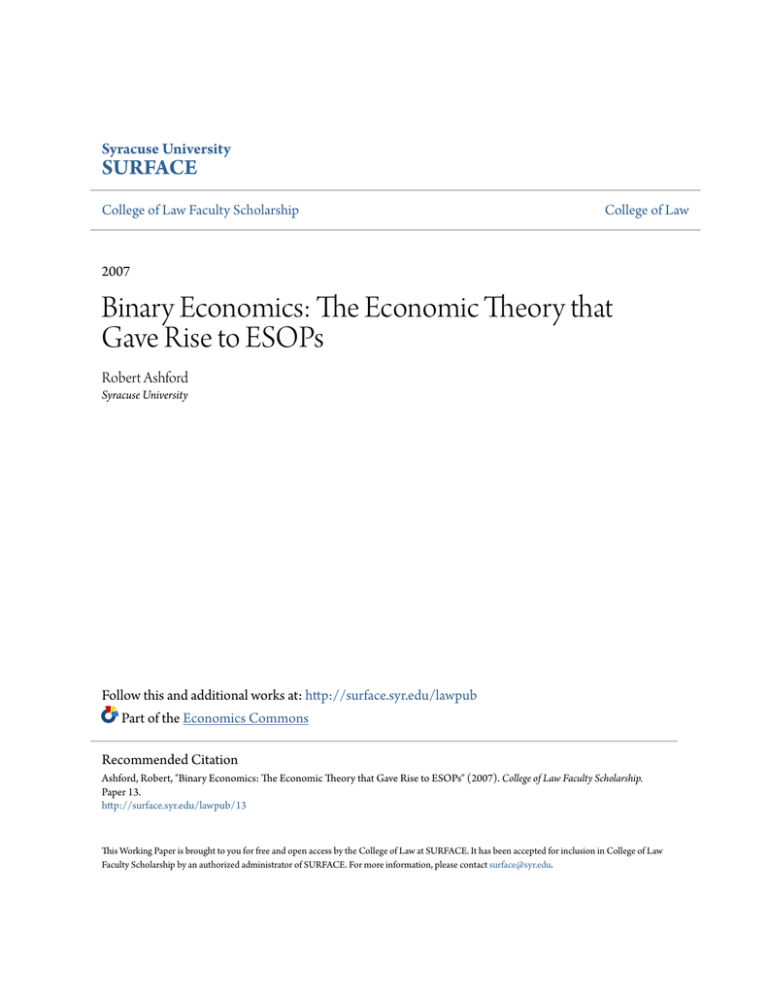
Syracuse University
SURFACE
College of Law Faculty Scholarship
College of Law
2007
Binary Economics: The Economic Theory that
Gave Rise to ESOPs
Robert Ashford
Syracuse University
Follow this and additional works at: http://surface.syr.edu/lawpub
Part of the Economics Commons
Recommended Citation
Ashford, Robert, "Binary Economics: The Economic Theory that Gave Rise to ESOPs" (2007). College of Law Faculty Scholarship.
Paper 13.
http://surface.syr.edu/lawpub/13
This Working Paper is brought to you for free and open access by the College of Law at SURFACE. It has been accepted for inclusion in College of Law
Faculty Scholarship by an authorized administrator of SURFACE. For more information, please contact surface@syr.edu.
“Binary Economics: The Theory That Gave Rise to ESOPs”
by
Robert Ashford
Professor of Law
Syracuse University College of Law
Syracuse, New York 13244
(Tel.) (315) 677-4680
rhashford@aol.com
Abstract
Many people know about Employee Stock Ownership Plans (ESOPs) which, along with
profit-sharing and pension plans, are treated as deferred compensation plans under Section 401 and related
sections of the Internal Revenue Code. ESOPs have been established by thousands of American
corporations, including some of the largest, and cover millions of employees. There is a national trade
association (The ESOP Association), that is now celebrating its 50th year in existence, and other
organizations established to support employee ownership, including the Ohio Center for Employee
Ownership that first published this article in its publication entitled Owners At Work (2006/7).
Most people aware of ESOPs, however, do not realize that ESOPs are part of a broader approach
to expanded capital ownership, broader prosperity, and economic justice known as binary economics.
Binary economics was first advanced by Louis Kelso, who is also widely known as the inventor of the
ESOP. But Louis Kelso's approach to economic theory is only partially reflected in the present ESOP
legislation. Binary economics offers a plan for more widespread economic prosperity for all people (not
limited to employees) than is presently offered by mainstream economics.
Once ESOP participants understand binary economics, they may choose to advocate legislative
reforms that will better serve their own economic interests and also the economic interests of their
companies and the country as a whole. These reforms would transform ESOPs into much more powerful
Super ESOPs in a full binary economy of the future. The Super ESOP will empower employees to acquire
shares of stock in their companies entirely with the earnings of capital and on much more favorable terms
than at present. Moreover, the Super ESOP will empower employees and others to acquire a diversified
portfolio of shares in other credit-worthy companies entirely with the future earnings of the shares they
acquire.
This article briefly describes the binary economics and its important connection with the ESOPs.
For a fuller explication if binary economics, see the following four articles which can be downloaded for
free from <<SSRN.COM>>: (1) “Binary Economics - An Overview,” (2) “Binary Economics and the Case
for Broader Ownership,” (3) “Capital Democratization, and (4) Memo on Binary Economics to Women
and People of Color re What Else can Corporations Do for Your Clients?”.
Electronic copy available at: http://ssrn.com/abstract=1092194
Binarv Economics
Robert Ashford
Editor's note: W l ~ e r should
e
employee ownership gofrom here? W h e n w e want to go beyor~dthe present and take big stepsforward, it can be
helpful to begin by returning to basics. Robert Asklford renzinds readers ofthc basis ofecolzonzic thinking underlying ESOPs and proposes a
next step inspired by the seminal ESOP thinker Louis Kelso.
M
any employees of ESOP companies do not realize
that their ESOPs are part of a broader approach to
expanded capital ownership, broader prosperity,
and economic justice known as "binary economics." Binary
economics was first advanced by Louis Kelso, who is also
widely known as the inventor of the ESOP. But Kelso's approach is only partially reflected in the present ESOP legislation. Binary economics offers a plan for more widespread
economic prosperity for all people than is presently offered
by mainstream economics. Once ESOP participants understand binary economics, they may choose to advocate legislative reforms that will better serve their own economic
interests and also the economic interests of their companies
and the country as a whole. These reforms would transform
ESOPs into much more powerful Super ESOPs in a full binary economy of the future.
The Super ESOP will empower employees to acquire shares
of stock in their companies entirely with the earnings of capital
and on much more favorable terms than at present. Moreover,
the Super ESOP will empower employees to acquire a diversified portfolio of shares in other credit-worthy companies entirely with thefuture earnings ofthe shares they acquire.
How Do People Acquire Capital?
Acquiring capital with the earnings of capital (rather than
the earnings of labor) is by no means a "pie in the sky" concept. The logic of profitable business is to invest in things that
pay for themselves in a competitive period of time. The purpose of corporate finance is to enable corporations to acquire
productive capital before they have earned the money to pay
for it. Credit-worthy corporations and wealthy people (i.e.,
"well-capitalized people") do it all the time. To enhance their
ability to acquire capital with the earnings of capital, profitable corporations and wealthy people use their existing
capital as collateral to borrow money to acquire more capital
(including sometimes whole companies) and then repay the
loans with the profits of the capital they acquire. In the binary
economy, the participation of poor and working people in
this process of acquiring capital with the earnings of capital
would be greatly expanded.
To foster economic growth and prosperity, mainstream
economic policy promotes capital acquisition with the earnings of capital primarily for well-capitalized people, but most
people presently have little or no participation in this process.
ESOPs have somewhat opened the door to capital acquisition
for a portion of the work force through a combination of deferred labor compensation, future company revenues, and corporate tax deductions. However, the full potential of ESOPs to
empower their participants to acquire capital with the earnings
of capital and to expand this empowerment to many more employees remains suppressed by mainstream policy.
Compared to well-capitalized people, poor and working
people are severely disadvantaged when it comes to acquiring capital. In general, mainstream economic policy requires
them to acquire capital by using their current labor earnings while those who already own substantial capital can
acquire additional capital either with their capital earnings
or with borrowed money that is repaid with the earnings
of the capital acquired. Because most employees need their
current labor earnings to provide for their families' current
living expenses, Kelso proposed an approach to capital acquisition that does not require workers to use their current
labor income either but rather enables them to acquire capital using the future income of the capital acquired just as
wealthy people are presently able to do.
Binary economists maintain that (1)using labor earnings is
not the best way for poor and working people to acquire capital
and (2) limiting capital acquisition with the earnings of capital primarily to wealthy people is not the best way to promote
economic growth and prosperity. According to government
statistics, almost all non-residential capital in the United States
is acquired with the earnings of capital; and very little nonresidential capital is acquired with the earnings of labor. Most
poor and working people do not have enough labor earnings
to support themselves and their families and consequently find
themselves increasingly in consumer debt. If most poor and
working people are ever to acquire viable capital estates and
eliminate their consumer debt, they will need to acquire capital
with the earnings of capital just as wealthy people do.
Moreover, to promote optimal growth and prosperity,
binary economists maintain that everyone (not just wealthy
people) should be empowered to acquire capital with the earnings of capital. The capital that presently profitably pays for
itself (i.e., "buys itself') with its own earnings primarily for
well-capitalized people can do so even more profitably if poor
and working people are brought into the process. Once poor
and working people are empowered to acquire capital with the
earnings of capital just as wealthy people do (1)poor and working people will grow more prosperous by increasingly earning
more spendable income from their ownership of capital, (2)
Owners At Work Winter 200612007
Electronic copy available at: http://ssrn.com/abstract=1092194
credit-worthy companies will more profitably (a) employ their
productive capacity and (b) invest in more productive capacity, and (3) the economy will grow more quickly.
1
11
I
1
Kelso's Special Insight: Capital Does Work
The difference between the mainstream and binary approaches
to promoting economic growth, prosperity, and capital acquisition all boils down to a fundamentally different understanding
of the role of capital in production, distribution, and growth.
According to mainstream economics, the primary role of capital is to make labor more productive. According to binary economics, the primary role of capital is to do a growing portion
of the work and distribute a growing portion of the income
earned from production.
Consider the work of washing machines, automatic bank
tellers, vending machines, and photocopiers. Although labor is
required to invent, design, build, install, operate and maintain
them, millions of such capital devices are doing much work
that was once done by entirely by people in ways that do not
relate in any direct way to increased labor productivity.
For example, a person hauls one sack of grain one mile
in one hour and is exhausted. With a horse, ten sacks can be
hauled four times as far (yielding a forty-fold increase in output); and with a truck, five hundred sacks can be hauled forty
times as far (yielding a twenty thousand-fold increase in output). Although no sacks would be hauled without people to
load the sacks, lead the horse or drive the truck, the work of
loading, leading and driving is n o t the work of hauling. The
horse and truck are doing- essentially all of the extra work. If
one person loaded sacks on the backs of ten other people and
that can be employed to do work (including land, animals,
structures, machines, tools, patents, copyrights and other intangibles protected as property).
When analyzing how production and productive capacity
have grown over the last several hundred years, mainstream
economics interprets the primary role of capital as merely increasing labor productivity, thereby allowing for a rise in output per unit of labor, higher wages, and the profitable employment of more labor. According to binary economics, however,
in contributing to economic growth, capital does much more
than increase the productivity of the people who work with
it. Increasingly capital is doing a growing portion of the total
work. TIie ecoriomic imperatiile is generally to produce more w i t h
more prodl~ctivecapital and less labor. Although capital may be
seen to concentrate higher productivity into fewer workers,
as the general rule, per unit of output and in the aggregate,
the primary effect of technological advance is to make capital
more productive than labor and thereby to replace and vastly
supplement the productiveness of labor with ever greater capital productiveness.
Moreover, capital works on both sides of the productionconsumption equation by providing vastly increased (1)productive capacity and production and (2) capacity to distribute
income and leisure. Thus capital can not only (1)replace labor,
(2) vastly supplement the work of labor with the work of capital, (3) do work that labor alone can never do, and (4) do work
with little or no labor, but capital can also (5) pay for itself out
Continued on page 14
Louis Kelso in 1974. (photo courtesy Baron W o l m a n )
The notion that the great increase in output is primarily the result of increased labor productivity does not describe reality.
earn increasingly by owning.
Thus, the "binary" in binary economics means "composed of two." It refers to the two ways of doing work
and earning income: by way of labor and by way of
capital. "Labor" includes all forms of physical and mental labor; and "capital"
refers to anything non-human
<
that can be owned and
Owners At Work Winter 200612007
13
Electronic copy available at: http://ssrn.com/abstract=1092194
Continuedfrorn page 13
of its future earnings and thereby (6) broaden its ownership to
distribute more broadly the income necessary to purchase its
increased output. According to binary economists, in a privateproperty market economy, it is the capacity of capital both to
do much more work and to distribute much more income and
leisure than labor that explains how broadening capital ownership promotes greater employment of existing capacity (both
capital and labor), capital investment, growth, and prosperity.
Broader Ownership Will Support a Larger Economy
Present demand for capital investment (and the labor employment necessary to create and operate it) is dependent on
demand for consumer goods in a future period. When poor
and working people begin to earn more capital income, they
are more likely than wealthier people to spend it for necessities and discretionary items. Without broadening ownership,
when wealthy people earn capital income beyond their consumption needs and desires, they will seek to invest that income, but with the prospect of comparatively less consumer
...binary
economists maintain that
the increasing productiveness of capital
coupled with broadening capital ownership provides even greater benefits for
employees and their companies.
demand. Therefore, a voluntary pattern of steadily broadening capital acquisition, ownership, and income promises more
production-based consumer demand in future years and both
strengthens the promise of capital to pay off loans used to buy
it out of its future earnings, and makes profitable the employment of more capital and labor. Thus the prospect of more
broadly distributed capital ownership boosts not only consumption but also demand for investment and employment.
According to mainstream economics, making labor more
productive offers great benefits. It (1)increases company profits, (2) enables companies to profitably hire more workers, (3)
enables companies to profitably pay higher wages, (4) increases the distribution of income to consumers, (5) causes a fuller
employment of productive capacity and (6) increases economic
growth by making more production profitable.
While not disputing that increased labor productivity can
have these effects, binary economists maintain that the increasing productiveness of capital coupled with broadening capital
ownership provides even greater benefits for employees and
their companies. The mainstream reliance on increasing labor
productivity to promote fuller employment of capital and labor
and a greater distribution of consumer income has an inherent
limitation that arises from the fact that capital is continually
replacing and vastly supplementing the work of labor with the
work of capital. Thus, labor's percentage claim on total pro-
duction is decreasing as capital increasingly does more of the
work. The mainstream approach (capital acquisition primarily
for wealthy people and jobs and welfare for everyone else) cannot distribute sufficient consumer income to a broad enough
consumer population to fully employ existing capacity and
promote optimal investment and sustainable growth. It must
be supplemented with the additional consumer income that
naturally results from the coupling of the increased productiveness of capital with a broader pattern of capital acquisition.
Thus, from a binary perspective, growth is primarily the result
of increasing capital productiveness and the distribution of its
ownership rather than increasing labor productivity.
Based on the mainstream economic preoccupation with
productivity, workers are taught to think that by focusing on
increased labor productivity, there is a stronger argument for
higher wages. That thinking should not divert attention from
the crucial need of every worker to acquire capital with the
earnings of capital and the financial interest of major corporations to enable their employees to do so.
Conclusion
Louis Kelso advanced binary economics not only as a means
of enabling employees to acquire shares in the companies that
employ them, but also as a means of enabling all poor and
working people to acquire diversified portfolios of shares in
the largest and most credit-worthy corporations. Few if any
wealthy people fail to acquire a substantial diversified portfolio of shares in these companies either directly or through
trusts and mutual funds. Guided by the principles of binary
economics, and using the same techniques that work for wellcapitalized people, the Super ESOPs of the future will have
the capacity to empower poor and working people to acquire
gradually viable, diversified capital portfolios of shares in these
companies, paid for with the earnings of the shares they acquire, just as well-capitalized people do, in ways that enhance
the profitability of those companies, more fully employ their
productive capacity, and greatly expand sustainable economic
prosperity and growth.
The binary approach to ownership broadening will be entirely voluntary and will operate without taxing or redistributing the capital or income of existing owners. The increased
growth and broadening prosperity of the binary economy will
be gradual; but once understood, these binary benefits will
prove increasingly attractive to corporations, their shareholders, and employees; and the binary approach to capital acquisition will transform the American economy into one of much
greater abundance for all.
0 2007 by Robert Ashford. All rights reserved. Robert Ashford
is Professor of Law at Syracuse University College of Law where
his subjects include corporations, professional responsibility and
binary economics. For a detailed explanation of the reforms necessary to establish the Super ESOP, readers are referred to B i n a y
Economics: The New Paradigm, by Robert Ashford and Rodney
Shakespeare, available from University Press of America. He can be
reached at rhashford@aol.com. orw
Owners At Work Winter 200612007


